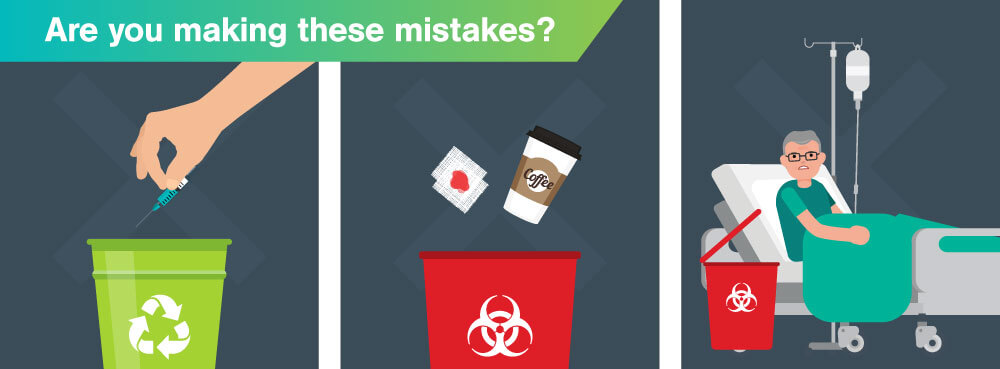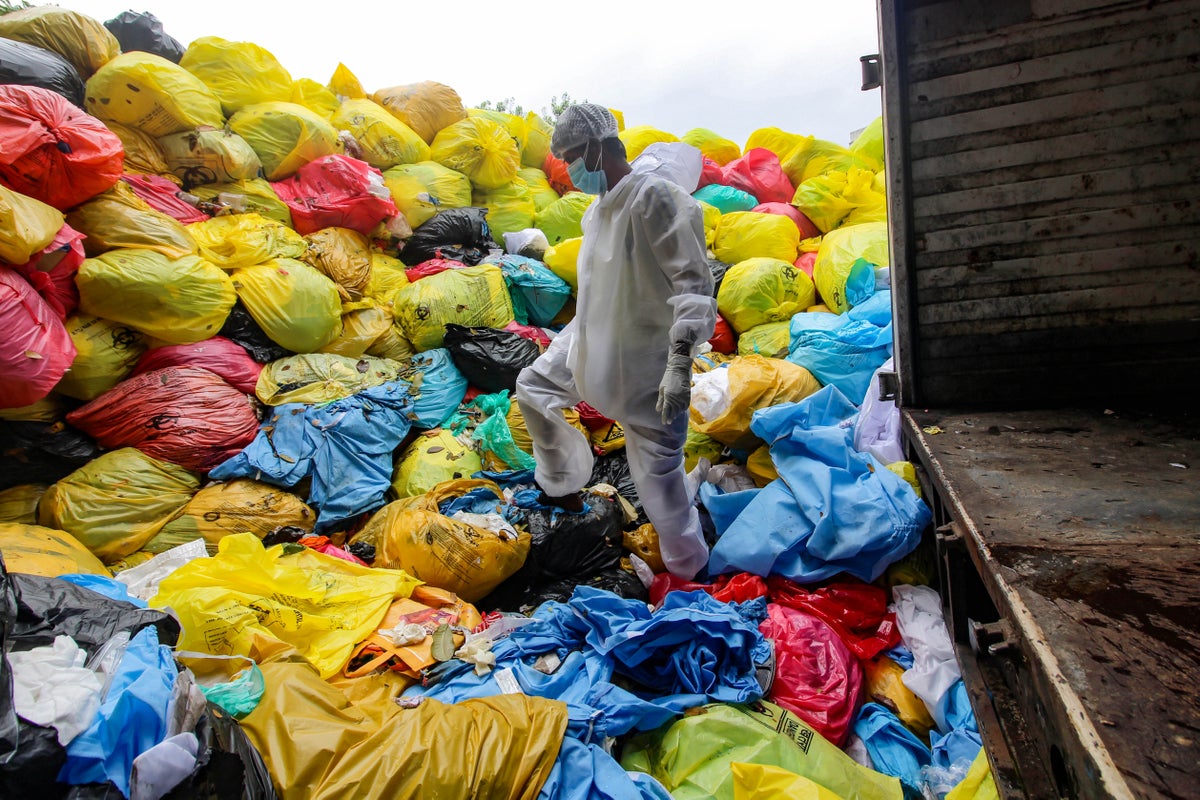Complete Medical Waste Removal Service: Smooth Disposal for Medical Care Facilities
The Relevance of Correctly Handling Clinical Waste
Proper administration of clinical waste is of utmost value in healthcare centers. The handling, storage space, and disposal of medical waste require stringent adherence to guidelines and policies to ensure the safety and security of individuals, medical care workers, and the environment. Health care centers have legal and regulative responsibilities to properly handle clinical waste, and failure to conform can result in fines and legal effects.
Wellness Dangers Connected With Improper Waste Monitoring
Incorrect management of medical waste presents substantial health and wellness risks to both healthcare workers and the public - WasteX Medical Waste Disposal. Clinical waste, that includes sharps, infectious products, pharmaceuticals, and contaminated materials, needs appropriate handling and disposal to prevent the spread of infections, injuries, and direct exposure to harmful substances
Among the main wellness risks connected with improper clinical waste monitoring is the transmission of contagious diseases. Healthcare workers who enter call with contaminated waste might contract diseases such as HIV, hepatitis, or other bloodborne pathogens. If medical waste is not correctly disposed of, it can contaminate the environment, water sources, and also food, leading to the spread of diseases within the neighborhood (medical waste removal).
Improper waste monitoring can additionally result in injuries, specifically from sharps such as needles, scalpels, and damaged glass. Unintended needle pricks can cause the transmission of bloodborne diseases, while cuts from sharp objects can trigger serious injuries and infections.
Furthermore, the inappropriate disposal of pharmaceutical waste can bring about the contamination of water supplies. When ended or unused medications are purged down the commode or discarded wrongly, the chemicals can seep right into water sources, impacting aquatic life and possibly entering the human food web.
Environmental Impact of Poorly Disposed Medical Waste
Among the substantial repercussions of poor monitoring of medical waste is its harmful influence on the atmosphere. Incorrectly disposed clinical waste postures a significant risk to environments, water bodies, and the total balance of the environment. WasteX Medical Waste Disposal. The harmful materials contained in clinical waste, such as contagious agents, drugs, and chemicals, can infect air, water, and soil, leading to widespread pollution and degradation
When clinical waste is not effectively segregated, dealt with, and disposed of, it can find its way right into water bodies through inappropriate garbage dump practices or unlawful disposing. This can result in the contamination of groundwater and surface area water, influencing water life and potentially polluting drinking water resources. The release of hazardous chemicals and drugs right into the atmosphere can interrupt environments and injury both animal and plant species.
Furthermore, improper incineration of medical waste can launch harmful toxins, including furans and dioxins, right into the ambience. These contaminants have actually been linked to numerous health and wellness problems, including breathing troubles, reproductive problems, and even cancer cells. The launch of greenhouse gases throughout incineration also adds to environment modification.
To minimize the environmental influence of incorrectly disposed clinical waste, it is important to implement appropriate waste monitoring techniques. This consists of segregation of waste at the resource, ideal therapy methods, and secure disposal strategies. By doing so, we can minimize the air pollution and secure the setting from the hazardous consequences of medical waste mismanagement.
Lawful and Governing Obligations for Health Care Facilities
In order to deal with the environmental effect of poorly disposed clinical waste, healthcare centers are needed to adhere to governing and legal commitments. These obligations are placed in place to ensure the correct handling, storage, transportation, and disposal of medical waste in a ecologically accountable and secure fashion.
One of the crucial legal commitments for medical care centers is to obtain the needed licenses and licenses for dealing with clinical waste. This includes getting a waste generator recognition number and abiding with federal, state, and local guidelines. Medical care centers need to also keep thorough records of the kinds and quantities of clinical waste produced, in addition to the techniques utilized for its disposal.
Moreover, healthcare facilities must execute appropriate partition and packaging procedures for different kinds of clinical waste, such as sharps, transmittable waste, and pharmaceutical waste - medical waste removal. This includes making use of watertight containers, biohazard bags, and sharps containers that fulfill regulatory standards
Healthcare centers are likewise in charge of making sure that their team obtain ideal training on the appropriate handling and disposal of clinical waste. This consists of training on infection control, individual protective devices, and waste administration procedures.
Ideal Practices for Safe Handling and Disposal of Medical Waste
To make sure the risk-free handling and disposal of medical waste, health care centers need to carry out finest methods. These techniques are important to protect the health and wellness and safety of both medical care workers and the basic public. The proper monitoring of medical waste is important in stopping the spread of transmittable conditions and reducing ecological contamination.
One of the very best practices for risk-free handling and disposal of medical waste is segregation. Health care facilities need to divide different types of medical waste, such as sharps, transmittable materials, and pharmaceutical waste, to avoid cross-contamination. Appropriate labeling and color coding of waste containers additionally play an important role in making certain the right partition of clinical waste.
Another crucial ideal method is making use of proper containers for storing and transporting medical waste. These containers ought to be watertight, puncture-resistant, and appropriately secured to stop any possible release of dangerous materials. Furthermore, health care centers must develop clear methods for the collection, storage space, and transportation of medical waste to reduce the threat of exposure and contamination.
In addition, healthcare centers must educate their personnel on the correct handling and disposal of clinical waste. Routine training sessions and refresher course training courses must be conducted to maintain healthcare employees updated on the most up to date laws and guidelines. This will certainly aid guarantee that everyone included in the procedure is conscious of the prospective threats and is furnished with the essential understanding and skills to deal with clinical waste safely.
Education and Training for Healthcare Professionals in Waste Management
Medical care experts need thorough education and learning and training in waste management to make certain the appropriate handling and disposal of clinical waste. The management of medical waste is a vital component of medical care operations as it directly influences the health and safety of both medical care web link workers and the public. Proper education and learning and training furnish health care specialists with the needed knowledge and skills to dispose and handle of clinical waste in a safe and environmentally accountable fashion.
Education and training programs for healthcare professionals in waste administration cover a series of subjects, consisting of the classification and segregation of medical waste, proper packaging and transportation, storage space and labeling requirements, and making use of personal safety devices. These programs also emphasize the value of adherence to local, nationwide, and global laws and standards governing medical waste monitoring.
By obtaining detailed education and learning and training in waste management, health care professionals can effectively lessen the risks related to clinical waste, such as the transmission of infectious conditions and the prospective damage to the setting. WasteX Medical Waste Disposal. Trained specialists can identify and execute ideal practices that advertise sustainability and reliable waste management methods within health care centers.
Constant education and learning and training in waste management ought to be a continuous top priority for healthcare experts, as waste administration methods and laws may progress with time. By staying updated with the most recent growths in waste management, health care professionals can make sure that they are geared up with the knowledge and skills needed to make educated decisions and add to the general improvement of waste monitoring methods in health care settings.

Conclusion
In verdict, proper management of clinical waste is essential to alleviate health and wellness risks and lessen the environmental effect. Healthcare facilities have governing and lawful obligations to make sure safe handling and disposal of clinical waste.

Healthcare specialists call for detailed education and training in waste management to ensure the appropriate handling and disposal of clinical waste - medical waste disposal service. The monitoring of clinical waste is a critical element of medical care operations as it straight impacts the wellness and safety and security of both health care employees and the general public